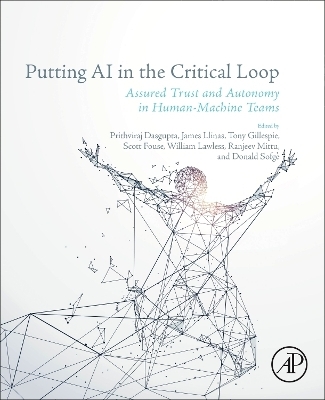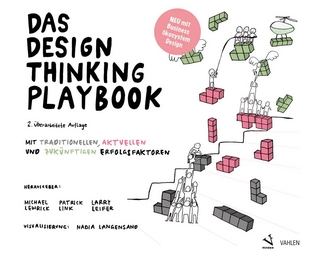
Putting AI in the Critical Loop
Academic Press Inc (Verlag)
978-0-443-15988-6 (ISBN)
Prithviraj (Raj) Dasgupta is a computer engineer with the Distributed Intelligent Systems Section at the Naval Research Laboratory in Washington, D.C. His research interests are in the areas of machine learning, AI-based game playing, game theory and multi-agent systems. He received his Ph.D. in 2001 from the University of California, Santa Barbara. From 2001 to 2019, he was a full Professor with the computer science department at the University of Nebraska, Omaha where he established and directed the CMANTIC Robotics Laboratory. He has authored over 150 publications in leading journals and conferences in his research area. He is a senior member of IEEE. James Llinas is an emeritus professor at the University at Buffalo, New York. He established and directed the Center for Multisource Information Fusion at the university, the only academic systems-centered information fusion center in the United States, leading it to carrying out well-funded multidisciplinary research for over 20 years. He was a co-author of the first book on data fusion and has co-edited and co-authored several additional books on data and information fusion. In 1998, he helped establish and was first President of the International Society for Information Fusion. Tony Gillespie is a visiting professor at University College London and a fellow of the Royal Academy of Engineering. His career includes academic, industrial, and government research and research management. His work on ensuring highly-automated weapons meet legal requirements has been extended to other autonomous systems in recent years, authoring a book and academic papers. He has acted as a technical adviser to the UN and other meetings discussing potential bans on autonomous weapon systems. Scott Fouse had a 42-year career in Aerospace R&D, mostly focused on exploring applications of AI to military applications. He was the VP of the Advanced Technology Center at Lockheed Martin Space where he led approximately 500 scientists and engineers performing research and development in space science and a variety of space systems-related technologies and capabilities. In prior appointments, Scott served as president and CEO of ISX Corporation and member of the Air Force Scientific Advisory Board where he supported a number of studies, directorate reviews, and chaired a study on experimentation to support disruptive innovation. Scott has a BS in Physics from the University of Central Florida and an MS in electrical engineering from the University of Southern California. William Lawless is professor of mathematics and psychology at Paine College, GA. For his PhD topic on group dynamics, he theorized about the causes of tragic mistakes made by large organizations with world-class scientists and engineers. After his PhD in 1992, DOE invited him to join its citizens advisory board (CAB) at DOE’s Savannah River Site (SRS), Aiken, SC. As a founding member, he coauthored numerous recommendations on environmental remediation from radioactive wastes (e.g., the regulated closure in 1997 of the first two high-level radioactive waste tanks in the USA). He is a member of INCOSE, IEEE, AAAI and AAAS. His research today is on autonomous human-machine teams (A-HMT). He is the lead editor of seven published books on artificial intelligence. He was lead organizer of a special issue on “human-machine teams and explainable AI by AI Magazine (2019). He has authored over 85 articles and book chapters, and over 175 peer-reviewed proceedings. He was the lead organizer of twelve AAAI symposia at Stanford (2020). Since 2018, he has also been serving on the Office of Naval Research's Advisory Boards for the Science of Artificial Intelligence and Command Decision Making. Ranjeev Mittu is the branch head for the Information Management and Decision Architectures Branch within the Information Technology Division at the U.S. Naval Research Laboratory (NRL). He leads a multidisciplinary group of scientists and engineers that conduct research and advanced development in visual analytics, human performance assessment, decision support systems, and enterprise systems. Mr. Mittu’s research expertise is in multi-agent systems, human-systems integration, artificial intelligence (AI), machine learning, data mining and pattern recognition; and he has authored and/or coedited nine books on the topic of AI in collaboration with national and international scientific communities spanning academia and defense. Mr. Mittu received a Master of Science Degree in Electrical Engineering in 1995 from The Johns Hopkins University in Baltimore, MD. Don Sofge is a computer scientist and roboticist at the Naval Research Laboratory (NRL) with 33 years of experience in artificial intelligence, machine learning, and control systems R&D. He leads the Distributed Autonomous Systems Group in the Navy Center for Applied Research in Artificial Intelligence (NCARAI), where he develops nature-inspired computing paradigms to challenging problems in sensing, artificial intelligence, and control of autonomous robotic systems. He has more than 180 refereed publications including 10 books in robotics, artificial intelligence, machine learning, planning, sensing, control, and related disciplines.
1. Introduction
2. Alternative paths to developing engineering solutions for human-machine teams
3. Risk determination versus risk perception: From hate speech, an erroneous drone attack, and military nuclear wastes to human machine autonomy
4. Appropriate Context-Dependent Artificial Trust in Human-Machine Teamwork
5. Toward a Causal Modeling Approach for Trust-Based Interventions in Human-Autonomy Teams
6. Risk Management in Human-in-the-Loop AI-Assisted Attention Aware Systems
7. Enabling Trustworthiness in Human-swarm Systems Through a Digital Twin
8. Building Trust with the Ethical Affordances of Education Technologies: A Sociotechnical Systems Perspective
9. Perceiving a Humorous Robot as a Social Partner
10. Real-Time AI: Using AI on the Tactical Edge
11. Building a Trustworthy AI Digital Twin: A Brave New World of Human Machine Teams & Autonomous Biological Internet of Things (BIoT)
12. A framework of Human Factors methods for safe, ethical, and usable Artificial Intelligence in Defence
13. A schema for harms-sensitive reasoning, and an approach to populate its ontology by human annotation
| Erscheinungsdatum | 03.01.2024 |
|---|---|
| Verlagsort | San Diego |
| Sprache | englisch |
| Maße | 191 x 235 mm |
| Gewicht | 520 g |
| Themenwelt | Informatik ► Software Entwicklung ► User Interfaces (HCI) |
| Informatik ► Theorie / Studium ► Künstliche Intelligenz / Robotik | |
| ISBN-10 | 0-443-15988-2 / 0443159882 |
| ISBN-13 | 978-0-443-15988-6 / 9780443159886 |
| Zustand | Neuware |
| Informationen gemäß Produktsicherheitsverordnung (GPSR) | |
| Haben Sie eine Frage zum Produkt? |
aus dem Bereich


